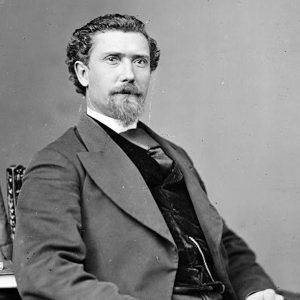calsfoundation@cals.org
Oliver P. Snyder (1833–1882)
Oliver P. Snyder was a Republican member of the U.S. House of Representatives. He represented the Second District of Arkansas in the Forty-Second and Forty-Third Congresses, serving from 1871 to 1875.
Oliver P. Snyder was born in New Madrid County in Missouri on November 13, 1833, to Jeremiah Snyder and Elizabeth Randolph Snyder. He completed a basic course of study before moving to Arkansas in 1853. There, he continued studies in both science and literature as well as the law. He was soon admitted to the bar, opening a practice in Pine Bluff (Jefferson County). As the Civil War drew to a close, Snyder, who had originally opposed secession, entered the political arena, winning election to the Arkansas House of Representatives in 1864 and 1865. Despite the state’s tenuous relationship with the Union, he was a Republican Party elector in 1864. As the state government reorganized after the war, Snyder served as a delegate to the state constitutional convention in 1867, where he helped write the new state constitution. Snyder served in the state Senate from 1868 to 1871. Putting his legal experience to use, Snyder served on a committee that undertook a full-scale review and rearrangement of the state’s statutes, while also chairing the Judiciary Committee.
Snyder had long harbored congressional ambitions, although—because of the political instability of the era—he had deferred running for office after being nominated in both 1865 and 1868. In 1870, Snyder won election to the U.S. House of Representatives as the Republican candidate, defeating incumbent Anthony Astley Cooper Rogers. Reflective of the deep political divisions of that era, Snyder’s own reelection bid two years later was hotly contested, although he won by a little over 100 votes.
Snyder started to establish himself in Washington DC. However, he could not effectively represent the Second District and at the same time remain aloof from the turmoil that engulfed Arkansas in 1874: the intra-party political conflict known as the Brooks-Baxter War. Snyder and the rest of the congressional delegation (save Democrat Thomas Gunter) beseeched President Ulysses S. Grant and his attorney general, George H. Williams, to intervene and restore peace, which they ultimately did, ending the Baxter-Brooks War with Elisha Baxter declared the legitimate governor. In part for his role in the matter, Snyder was defeated for re-nomination when he sought reelection in 1874. The fact that he had joined most of his colleagues in voting themselves a raise in 1873 did not help his prospects. The vote garnered criticism in the local papers, reinforcing Snyder’s reputation as a loyal, perhaps overly so, party member. However, Snyder’s party loyalty, a status likened by one opposition newspaper to a dog-like faithfulness, did earn him the postal appointment in Little Rock (Pulaski County) in 1875. In 1880, Snyder served as a delegate from Arkansas to the Republican National Convention.
Snyder returned to the practice of law in Pine Bluff and was again the Republican nominee for Congress in 1876. However, his bid to unseat his successor, William Slemons, was unsuccessful. He continued his involvement in public affairs, being elected in 1882 as treasurer of Jefferson County.
Snyder died in Pine Bluff on November 22, 1882. He is interred in Bellwood Cemetery.
For additional information:
“Notes and Comments.” St. Albans Daily Messenger (St. Albans, Vermont), March 26, 1875, p. 2.
“Oliver P. Snyder.” Biographical Directory of the United States Congress. http://bioguide.congress.gov/scripts/biodisplay.pl?index=S000671 (accessed October 5, 2021).
William H. Pruden III
Ravenscroft School
 Oliver P. Snyder
Oliver P. Snyder 



Comments
No comments on this entry yet.